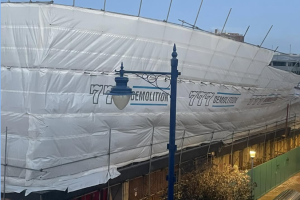In a rare Saturday sitting, Prime Minister Sir Keir Starmer has recalled Parliament to push through emergency legislation aimed at preventing the closure of British Steel’s Scunthorpe plant, the UK’s last facility capable of producing virgin steel from iron ore.
The move follows growing fears over the plant’s future after Chinese owner Jingye reportedly halted orders for essential raw materials, triggering an industrial crisis that threatens 3,000 direct jobs and thousands more in the supply chain. The Steel Industry (Special Measures) Bill, due to be debated and voted on today, seeks to give ministers emergency powers to intervene.
“Jobs. Investment. Growth.”
Speaking ahead of the vote, Starmer described the situation as a “national emergency,” adding:
“I’ve been to Scunthorpe. I’ve met the steelworkers. I know how important steel is — not just to the region, but to the whole country.”
He emphasised that “all options are on the table”, including nationalisation if necessary, although government sources clarified that immediate efforts are focused on keeping the blast furnaces running.
The emergency legislation will give the Business Secretary powers to direct companies operating in the steel industry, preventing closures that could damage national security and economic stability. Today’s parliamentary recall marks the first emergency sitting since August 2021, highlighting the urgency of the situation.
Why It Matters
The Scunthorpe plant is crucial for the UK’s ability to produce steel for infrastructure, transport, and defence projects. Its closure would effectively end the UK’s capacity to produce virgin steel, making the country dependent on imports and compromising Starmer’s Plan for Change, which includes major investment in green and public infrastructure.
Jingye had previously rejected a £500 million government package aimed at transitioning the plant to cleaner electric arc furnaces, intensifying the crisis.
Political and Public Reaction
Public response on social media has been mixed. One user on X wrote: “Starmer’s stepping up for British workers — about time someone fought for our industries.” Others were more cautious, warning the legislation may be a short-term fix: “You can’t legislate away decades of decline.”
Unions, however, have praised the move. Sharon Graham, General Secretary of Unite, called it:
“Absolutely the right thing to do. Steel must be designated as critical national infrastructure — this cannot happen again.”
Opposition voices welcomed the intervention but called for a longer-term strategy. Sir Ed Davey, leader of the Liberal Democrats, urged for a “sustainable plan” for UK steel. Plaid Cymru MP Liz Saville Roberts criticised what she called Labour’s “inconsistent” support, citing less intervention during the downsizing at Tata Steel in Port Talbot.
Challenges Ahead
While the proposed bill offers immediate protection, challenges remain. Jingye’s rejection of previous support raises concerns over future cooperation. If nationalisation becomes necessary, it could cost the Treasury hundreds of millions, fuelling debate over public spending.
Conservative leader Kemi Badenoch has warned nationalisation should be a “last resort”, adding:
“We need to invest in the future of UK steel, but we must also ensure taxpayers aren’t left to foot the bill for private sector mismanagement.”
Environmental questions also linger. Transitioning Scunthorpe to green steel requires time and infrastructure — neither of which can be resolved overnight.
A Nation at a Crossroads
The British Steel crisis highlights broader issues of industrial decline and the UK’s precarious position in global steel production. Over the past decade, the UK has seen a steeper decline in steel output than any other G20 nation, according to industry analysts.
Starmer’s intervention may be politically risky — but it marks a clear shift in tone from previous governments, signalling a willingness to use state power to protect strategic industries.
What Happens Next?
Parliament convenes today, with the House of Commons meeting at 11 a.m., followed by the House of Lords at noon, to fast-track the Steel Industry (Special Measures) Bill through both chambers.
If passed, it could provide the legal tools needed to keep the blast furnaces operational and allow further negotiations with Jingye or alternative operators.
Whether this bold step will be enough to secure the long-term future of British steel remains to be seen — but for the thousands of workers in Scunthorpe, today’s debate could decide their future.







































